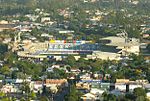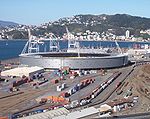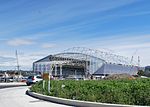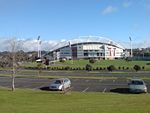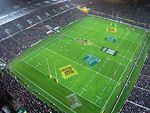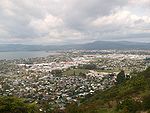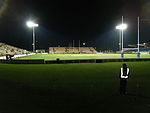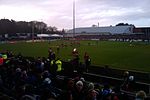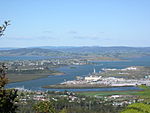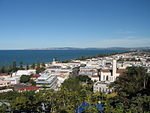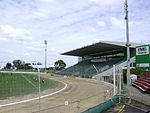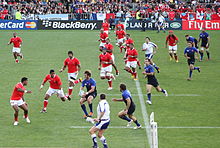- 2011 Rugby World Cup
-
2011 Rugby World Cup 
Tournament details Host nation  New Zealand
New ZealandDates 9 September – 23 October No. of nations 20 (91 qualifying) Final positions Champions 
 New Zealand
New ZealandRunner-up 
 France
FranceThird-place 
 Australia
AustraliaTournament statistics Matches played 48 Attendance 1,477,294 (30,777 per match) Top scorer(s)  Morné Steyn (62)
Morné Steyn (62)Most tries  Chris Ashton
Chris Ashton
 Vincent Clerc (6)← 20072015 →
Vincent Clerc (6)← 20072015 →The 2011 Rugby World Cup was the seventh Rugby World Cup, a quadrennial international rugby union competition inaugurated in 1987. The International Rugby Board (IRB) selected New Zealand as the host country in preference to Japan and South Africa at a meeting in Dublin on 17 November 2005. The IRB Council eliminated South Africa in the first of two rounds of voting.
The tournament was won by New Zealand, who defeated France 8–7 in the final.[1] South Africa, the defending champions, were eliminated by Australia 11–9 in the quarter-finals.
It was the largest sporting event ever held in New Zealand,[2] eclipsing the 1987 Rugby World Cup, 1990 Commonwealth Games, 1992 Cricket World Cup and the 2003 America's Cup.[3] The organisers expected 95,000 visitors from overseas to travel to New Zealand for the event.[4]
The games ran over six weeks starting on 9 September 2011. The final was played on Sunday 23 October 2011, a date chosen because it fell on a long weekend caused by the New Zealand public holiday of Labour Day (Monday, 24 October 2011).[5] The final was played at Eden Park in Auckland.[6]
After speculation that the number of participating teams would be reduced to 16, the IRB announced on 30 November 2007 that the 2011 tournament would again feature 20 teams.[7] Twelve teams qualified as a result of finishing in the top three in each pool in the 2007 tournament. The remaining eight berths were determined by regional qualifying tournaments.[8] Of the 20 countries that competed in the previous World Cup in 2007, there was only one change – Russia replaced Portugal.
Contents
Host selection
New Zealand co-hosted the first Rugby World Cup with Australia in 1987. Originally set to co-host the 2003 tournament with Australia, a disagreement over ground signage rights saw the New Zealand games dropped and Australia became the sole host. The 2011 New Zealand bid contained plans to enlarge the size of Eden Park and other stadia to help increase the commercial viability of the bid.
If it were to have been held in Japan it would be the first time a Rugby World Cup had taken place in Asia. With stadia from the 2002 FIFA World Cup, it had the necessary infrastructure already in place. Japan eventually succeeded in its aim to host a World Cup in 2009, when it was awarded the 2019 Rugby World Cup.
The South African bid, led by former national captain Francois Pienaar, had strong support from their government. It successfully hosted the tournament in 1995.
The New Zealand bid was led by the New Zealand Rugby Union (at the time of bidding known as the New Zealand Rugby Football Union) and supported by the New Zealand Government, through the Prime Minister and current players, represented by the All Black captain. After winning the bid, the NZRFU expressed extreme disappointment towards their Australian counterparts who voted against New Zealand hosting the event, due to the NZRFU's misplaced expectation that the "ANZAC spirit" would result in a vote for New Zealand.
After an IRB inspection of each applicant host nation during June and July 2005, the winning bid of New Zealand was announced during the IRB Council meeting in Dublin on 17 November 2005.
Preparations
Costs and benefits
The event is expected to cost about NZ$310 million to run and to generate NZ$280 million in ticket sales.[9] In Auckland, the city where many of the most important games will take place, the costs to the local ratepayers alone has been estimated at $102 million.[10]
Ticket sales exceeding NZ$285 million, accommodation-related spending of another NZ$260 million, and NZ$236 million spent on food and drink should provide a significant fiscal stimulus, of nearly 1.4% of the quarterly GDP.[11]
Concerns
In the years between winning the bid and the staging of the event, New Zealand news media and social agencies cast aspersions on the nation's readiness and appropriate use of national funds for sports infrastructure, as has happened with most large, international, quadrennial, multi-location sporting events of recent decades such as the 2012 Olympics, 2010 FIFA World Cup and the 2010 Commonwealth Games. Concerns were raised about the process of upgrading Eden Park to expand the capacity to the 60,000 required by the IRB. In late 2008 Rugby World Cup Minister Murray McCully said the remaining consent process might need to be overridden by legislation for the work to be completed on time.[12]
A July 2009 report by the Auckland Regional Transport Authority, released under the Official Information Act, warned of lack of readiness and complacency, despite the fact that "the levels of patron movement and operational standard [needed for the RWC] are in reality significantly above what is currently delivered."[13] The report was dismissed by Michael Barnett, the Auckland Chamber of Commerce CEO and planning co-coordinator for RWC events in Auckland, who characterised it as a case of "a Wellington media organisation us[ing] an outdated report".[14]
The nation's largest hospitality workers' union, Unite, which represents 25% of hotel, restaurant and casino workers in New Zealand, demanded that workers share in windfall profits and said there was the possibility of a strike during the tournament.[15]
The construction of Dunedin's Forsyth Barr Stadium, known during the tournament as Otago Stadium, was a source of concern as the project was operating in a tight time frame. An April 2010 progress report stated that the project remained on target for completion prior to the Rugby World Cup, although there was a medium level of risk with some significant and potentially damaging concerns.[16] If the project had not been completed on time, organisers would have reverted to Carisbrook as the backup option. Forsyth Barr Stadium was officially opened on 6 August 2011.[17]
Damage caused by the 2011 Christchurch earthquake forced the relocation of a number of cup matches, including the quarter finals.[18]
Warm-up matches
The 2011 Tri Nations Series was shortened to include only six games instead of the usual nine. It served as the primary preparation for the tournament for Australia, South Africa and New Zealand. In the northern hemisphere, a series of friendlies played in August 2011 replaced the annual tours to the southern hemisphere. North American entrants Canada beat USA in two warm-up friendlies in August 2011.
Qualifying
Main article: 2011 Rugby World Cup qualifyingTwenty teams competed in the 2011 World Cup. Twelve teams qualified by finishing in the top three of their pool in the 2007 Rugby World Cup.[8][19]
Africa Americas Europe Oceania/Asia  Namibia (Africa)
Namibia (Africa) South Africa (World Champions)
South Africa (World Champions)
 Argentina
Argentina Canada (Americas 1)
Canada (Americas 1) United States (Americas 2)
United States (Americas 2)
Twelve of the nations at this tournament had competed in every previous Rugby World Cup – Argentina, Australia, Canada, England, France, Ireland, Italy, Japan, New Zealand, Romania, Scotland, and Wales. All the other sides also had previous World Cup experience, except for Russia who appeared in a Rugby World Cup for the first time.Venues
The 13 venues for the 2011 Rugby World Cup were confirmed on 12 March 2009.[20] A number of the venues were redeveloped to increase capacity for the event. The Government considered passing a law bypassing the consent process to allow all the stadiums' redevelopment to be completed in time.[12]
Due to damage to Stadium Christchurch and many other facilities in Christchurch caused by the earthquake on 22 February 2011, it was announced on 16 March that the matches to be played in the city would be relocated. The two quarter-finals scheduled would be moved to Auckland, while the five group matches will move to other centres.[21]
On 10 November 2006, the New Zealand Government announced plans for Stadium New Zealand in Auckland. The proposal was to build the new stadium seating 70,000 on the waterfront. After much public outcry, and lack of support from the Auckland Regional Council, the proposal was dropped in favour of the redevelopment of Eden Park. The redevelopment of Eden Park's Southern and South Western stands was completed during 2010.
Dunedin's new stadium, named Forsyth Barr Stadium at University Plaza, was completed in August 2011 and was used instead of Carisbrook.[22]
- ^1 with temporary seating
Draw
Seeding of teams for the 2011 World Cup was based on their respective IRB World Rankings.[23] The top four at the 2007 Rugby World Cup (South Africa, England, Argentina, and France) were not therefore allocated top pool spots, but "the rankings are now very well established and provide us with a credible and succinct way of seeding teams for the rugby World Cup pool draw", according to Rugby World Cup Ltd (RWCL) chairman Syd Millar.[23]
The draw was conducted in December 2008 and used the World Rankings as of 1 December 2008,[24] after the Northern Hemisphere Autumn internationals.[25] The teams were placed into three bands depending on their seedings at the time, with one team from each band in each of the groups.[23] The rankings and bands were therefore: New Zealand (1), South Africa (2), Australia (3) and Argentina (4); Wales (5), England (6), France (7) and Ireland (8); Scotland (9), Fiji (10), Italy (11) and Tonga (12).[24]
The full draw and venues for the tournament were announced on 12 March 2009.[26]
The opening match saw the hosts, New Zealand, take on Tonga.
By coincidence, the final match and third-place playoff match were between the countries which contested the same matches at the first Rugby World Cup, which were also held in New Zealand, in 1987.
Squads
Main article: 2011 Rugby World Cup squadsEach country was allowed a squad of 30 players for the tournament. These squads were to be submitted to the International Rugby Board by a deadline of 22 August 2011.[27] Once the squad was submitted a player could be replaced if injured, but would not be allowed to return to the squad. There is also a stand-down period of 72 hours before the new player is allowed to take the field. Hence, a replacement player called into a squad on the eve of a game will not be permitted to play in that game.
Match officials
On 8 April 2011, the IRB named ten referees, seven assistant referees and four television match officials to handle the group stage games. Two of the seven assistants will also be reserve referees if required.[28]
- Referees[28]
 Wayne Barnes
Wayne Barnes George Clancy
George Clancy Craig Joubert
Craig Joubert Jonathan Kaplan
Jonathan Kaplan Bryce Lawrence
Bryce Lawrence Nigel Owens
Nigel Owens Dave Pearson
Dave Pearson Romain Poite
Romain Poite Alain Rolland
Alain Rolland Steve Walsh
Steve Walsh
- Reserve and assistant referees[28]
- Assistant referees[28]
- Television match officials[28]
Pool stage
Pool A Pool B Pool C Pool D The first round, or pool stage, saw the twenty teams divided into four pools of five teams using the same format that was used in 2003 and in 2007. Each pool was a round-robin of ten games, where each team played one match against each of the other teams in the same pool. Teams were awarded four points for a win, two points for a draw and none for a defeat. A team scoring four or more tries in one match scored a bonus point, as did a team losing by seven or fewer points.
The teams finishing in the top two of each pool advanced to the quarterfinals. The top three teams of each pool have automatically qualified for the 2015 Rugby World Cup.
If two or more teams were tied on match points, the following tiebreakers would have applied:
- The winner of the match between the two teams (would not apply if more than two teams were tied);
- Difference between points scored for and points scored against in all pool matches;
- Difference between tries scored for and tries scored against in all pool matches;
- Points scored in all pool matches;
- Most tries scored in all pool matches;
- Official IRB World Rankings as of 3 October 2011.[29]
Key to colours in pool tables Advanced to the quarter-finals and qualified for the 2015 Rugby World Cup Eliminated but qualified for 2015 Rugby World Cup Pld = matches played, W = matches won, D = draws, L = losses, TF = tries for, PF = match points for, PA = match points against, +/− = sum total of points for/against, BP = bonus points, Pts = pool points
Pool A
Main article: 2011 Rugby World Cup Pool ATeamPld W D L TF PF PA +/− BP Pts  New Zealand
New Zealand4 4 0 0 36 240 49 +191 4 20  France
France4 2 0 2 13 124 96 +28 3 11  Tonga
Tonga4 2 0 2 7 80 98 −18 1 9  Canada
Canada4 1 1 2 9 82 168 −86 0 6  Japan
Japan4 0 1 3 8 69 184 −115 0 2 9 September 2011 New Zealand 
41–10  Tonga
TongaEden Park, Auckland 10 September 2011 France 
47–21  Japan
JapanNorth Harbour Stadium, Auckland 14 September 2011 Tonga 
20–25  Canada
CanadaNorthland Events Centre, Whangarei 16 September 2011 New Zealand 
83–7  Japan
JapanWaikato Stadium, Hamilton 18 September 2011 France 
46–19  Canada
CanadaMcLean Park, Napier 21 September 2011 Tonga 
31–18  Japan
JapanNorthland Events Centre, Whangarei 24 September 2011 New Zealand 
37–17  France
FranceEden Park, Auckland 27 September 2011 Canada 
23–23  Japan
JapanMcLean Park, Napier 1 October 2011 France 
14–19  Tonga
TongaRegional Stadium, Wellington 2 October 2011 New Zealand 
79–15  Canada
CanadaRegional Stadium, Wellington Pool B
Main article: 2011 Rugby World Cup Pool BTeamPld W D L TF PF PA +/− BP Pts  England
England4 4 0 0 18 137 34 +103 2 18  Argentina
Argentina4 3 0 1 10 90 40 +50 2 14  Scotland
Scotland4 2 0 2 4 73 59 +14 3 11  Georgia
Georgia4 1 0 3 3 48 90 −42 0 4  Romania
Romania4 0 0 4 3 44 169 −125 0 0 10 September 2011 Scotland 
34–24  Romania
RomaniaRugby Park Stadium, Invercargill 10 September 2011 England 
13–9  Argentina
ArgentinaOtago Stadium, Dunedin 14 September 2011 Scotland 
15–6  Georgia
GeorgiaRugby Park Stadium, Invercargill 17 September 2011 Argentina 
43–8  Romania
RomaniaRugby Park Stadium, Invercargill 18 September 2011 England 
41–10  Georgia
GeorgiaOtago Stadium, Dunedin 24 September 2011 England 
67–3  Romania
RomaniaOtago Stadium, Dunedin 25 September 2011 Argentina 
13–12  Scotland
ScotlandRegional Stadium, Wellington 28 September 2011 Georgia 
25–9  Romania
RomaniaArena Manawatu, Palmerston North 1 October 2011 England 
16–12  Scotland
ScotlandEden Park, Auckland 2 October 2011 Argentina 
25–7  Georgia
GeorgiaArena Manawatu, Palmerston North Pool C
Main article: 2011 Rugby World Cup Pool CTeamPld W D L TF PF PA +/− BP Pts  Ireland
Ireland4 4 0 0 15 135 34 +101 1 17  Australia
Australia4 3 0 1 25 173 48 +125 3 15  Italy
Italy4 2 0 2 13 92 95 −3 2 10  United States
United States4 1 0 3 4 38 122 −84 0 4  Russia
Russia4 0 0 4 8 57 196 −139 1 1 11 September 2011 Australia 
32–6  Italy
ItalyNorth Harbour Stadium, Auckland 11 September 2011 Ireland 
22–10  United States
United StatesStadium Taranaki, New Plymouth 15 September 2011 Russia 
6–13  United States
United StatesStadium Taranaki, New Plymouth 17 September 2011 Australia 
6–15  Ireland
IrelandEden Park, Auckland 20 September 2011 Italy 
53–17  Russia
RussiaTrafalgar Park, Nelson 23 September 2011 Australia 
67–5  United States
United StatesRegional Stadium, Wellington 25 September 2011 Ireland 
62–12  Russia
RussiaInternational Stadium, Rotorua 27 September 2011 Italy 
27–10  United States
United StatesTrafalgar Park, Nelson 1 October 2011 Australia 
68–22  Russia
RussiaTrafalgar Park, Nelson 2 October 2011 Ireland 
36–6  Italy
ItalyOtago Stadium, Dunedin Pool D
Main article: 2011 Rugby World Cup Pool DTeamPld W D L TF PF PA +/− BP Pts  South Africa
South Africa4 4 0 0 21 166 24 +142 2 18  Wales
Wales4 3 0 1 23 180 34 +146 3 15  Samoa
Samoa4 2 0 2 9 91 49 +42 2 10  Fiji
Fiji4 1 0 3 7 59 167 −108 1 5  Namibia
Namibia4 0 0 4 5 44 266 −222 0 0 10 September 2011 Fiji 
49–25  Namibia
NamibiaInternational Stadium, Rotorua 11 September 2011 South Africa 
17–16  Wales
WalesRegional Stadium, Wellington 14 September 2011 Samoa 
49–12  Namibia
NamibiaInternational Stadium, Rotorua 17 September 2011 South Africa 
49–3  Fiji
FijiRegional Stadium, Wellington 18 September 2011 Wales 
17–10  Samoa
SamoaWaikato Stadium, Hamilton 22 September 2011 South Africa 
87–0  Namibia
NamibiaNorth Harbour Stadium, Auckland 25 September 2011 Fiji 
7–27  Samoa
SamoaEden Park, Auckland 26 September 2011 Wales 
81–7  Namibia
NamibiaStadium Taranaki, New Plymouth 30 September 2011 South Africa 
13–5  Samoa
SamoaNorth Harbour Stadium, Auckland 2 October 2011 Wales 
66–0  Fiji
FijiWaikato Stadium, Hamilton Knockout stage
Main article: 2011 Rugby World Cup knockout stageQuarter-finals Semi-finals Final 8 October – Wellington  Ireland
Ireland10 15 October – Auckland  Wales
Wales22  Wales
Wales8 8 October – Auckland  France
France9  England
England12 23 October – Auckland  France
France19  France
France7 9 October – Wellington  New Zealand
New Zealand8  South Africa
South Africa9 16 October – Auckland  Australia
Australia11  Australia
Australia6 Third place 9 October – Auckland  New Zealand
New Zealand20  New Zealand
New Zealand33  Wales
Wales18  Argentina
Argentina10  Australia
Australia21 21 October – Auckland Quarter-finals
Ireland vs Wales
8 October 2011
18:00 NZDT (UTC+13)Ireland 
10 – 22  Wales
WalesRegional Stadium, Wellington
Attendance: 35,787
Referee: Craig Joubert (South Africa)Try: Earls 45' c
Con: O'Gara (1/1)
Pen: O'Gara (1/1) 24'Report Try: Williams 3' c
Phillips 51' m
J. Davies 64' c
Con: Priestland (2/3)
Pen: Halfpenny (1/1) 29'
England vs France
8 October 2011
20:30 NZDT (UTC+13)England 
12 – 19  France
FranceEden Park, Auckland
Attendance: 49,105
Referee: Steve Walsh (Australia)Try: Foden 55' c
Cueto 77' m
Con: Wilkinson (1/1)Report Try: Clerc 22' m
Médard 31' m
Pen: Yachvili (2/3) 11', 16'
Drop: Trinh-Duc (1/1) 73'
South Africa vs Australia
9 October 2011
18:00 NZDT (UTC+13)South Africa 
9 – 11  Australia
AustraliaRegional Stadium, Wellington
Attendance: 34,914
Referee: Bryce Lawrence (New Zealand)Pen: M. Steyn (2/4) 39', 56'
Drop: M. Steyn (1/1) 60'Report Try: Horwill 11' m
Pen: O'Connor (2/2) 17', 72'
New Zealand vs Argentina
9 October 2011
20:30 NZDT (UTC+13)New Zealand 
33 – 10  Argentina
ArgentinaEden Park, Auckland
Attendance: 57,192
Referee: Nigel Owens (Wales)Try: Read 69' m
Thorn 79' c
Con: Cruden (1/1)
Pen: Weepu (7/7) 13', 26', 36', 40', 50', 59', 73'Report Try: Farías Cabello 32' c
Con: Contepomi (1/1)
Pen: Bosch (1/1) 46'Semi-finals
Wales vs France
15 October 2011
21:00 NZDT (UTC+13)Wales 
8 – 9  France
FranceEden Park, Auckland
Attendance: 58,630
Referee: Alain Rolland (Ireland)Try: Phillips 58' m
Pen: Hook (1/3) 8'Report Pen: Parra (3/3) 22', 35', 51'
Australia vs New Zealand
16 October 2011
21:00 NZDT (UTC+13)Australia 
6 – 20  New Zealand
New ZealandEden Park, Auckland
Attendance: 60,087
Referee: Craig Joubert (South Africa)Pen: O'Connor (1/1) 16'
Drop: Cooper (1/1) 32'Report Try: Nonu 6' m
Pen: Weepu (4/7) 13', 38', 43', 73'
Drop: Cruden (1/1) 22'
Bronze final: Wales vs Australia
21 October 2011
20:30 NZDT (UTC+13)Wales 
18 – 21  Australia
AustraliaEden Park, Auckland
Attendance: 53,014
Referee: Wayne Barnes (England)Try: Shane Williams 50' m
Halfpenny 80+' c
Con: S. Jones (1/1)
Pen: Hook (1/2) 20'
S. Jones (1/1) 71'Report Try: Barnes 12' c
McCalman 76' m
Con: O'Connor (1/2)
Pen: O'Connor (2/4) 54', 58'
Drop: Barnes (1/1) 68'
Final: France vs New Zealand
Main article: 2011 Rugby World Cup Final23 October 2011
21:00 NZDT (UTC+13)France 
7 – 8  New Zealand
New ZealandEden Park, Auckland
Attendance: 61,079
Referee: Craig Joubert (South Africa)Try: Dusautoir 47' c
Con: Trinh-Duc 49' (1/1)Report Try: Woodcock 15' m
Pen: Donald (1/1) 46'Point scorers
Main article: 2011 Rugby World Cup statisticsOverall Points Scorers Player Team Total Details Tries Conversions Penalties Drop Goals Morné Steyn  South Africa
South Africa53 2 14 5 0 Kurt Morath  Tonga
Tonga45 0 6 11 0 Ronan O'Gara  Ireland
Ireland44 0 10 8 0 Dimitri Yachvili  France
France37 0 8 7 0 Colin Slade  New Zealand
New Zealand36 1 14 1 0 James O'Connor  Australia
Australia35 1 12 2 0 James Arlidge  Japan
Japan34 2 3 6 0 Chris Ashton  England
England30 6 0 0 0 Vincent Clerc  France
France30 6 0 0 0 Rhys Priestland  Wales
Wales29 0 10 3 0 Piri Weepu  New Zealand
New Zealand29 0 4 7 0 Jonny Wilkinson  England
England28 0 5 5 1 Morgan Parra  France
France28 1 4 5 0 Merab Kvirikashvili  Georgia
Georgia28 0 2 8 0 Adam Ashley-Cooper  Australia
Australia25 5 0 0 0 Keith Earls  Ireland
Ireland25 5 0 0 0 Israel Dagg  New Zealand
New Zealand25 5 0 0 0 Tusi Pisi  Samoa
Samoa25 0 2 6 1 Felipe Contepomi  Argentina
Argentina24 1 2 5 0 Theuns Kotze  Namibia
Namibia24 1 2 2 3 Dan Parks  Scotland
Scotland24 0 0 5 3 Chris Paterson  Scotland
Scotland23 0 1 7 0 Stephen Jones  Wales
Wales23 0 10 1 0 Ander Monro  Canada
Canada22 1 1 3 2 Seremaia Bai  Fiji
Fiji22 0 5 4 0 Toby Flood  England
England21 0 9 1 0 Jonathan Sexton  Ireland
Ireland21 0 3 4 1 Dan Carter  New Zealand
New Zealand21 0 6 2 1 Paul Williams  Samoa
Samoa21 1 5 2 0 François Steyn  South Africa
South Africa21 3 0 2 0 James Pritchard  Canada
Canada20 0 4 4 0 Mark Cueto  England
England20 4 0 0 0 Vereniki Goneva  Fiji
Fiji20 4 0 0 0 Zac Guildford  New Zealand
New Zealand20 4 0 0 0 Richard Kahui  New Zealand
New Zealand20 4 0 0 0 Jerome Kaino  New Zealand
New Zealand20 4 0 0 0 Sonny Bill Williams  New Zealand
New Zealand20 4 0 0 0 Scott Williams  Wales
Wales20 4 0 0 0 Martín Rodríguez  Argentina
Argentina19 0 5 3 0 Mirco Bergamasco  Italy
Italy19 0 2 5 0 Konstantin Rachkov  Russia
Russia19 1 4 1 1 Berrick Barnes  Australia
Australia18 2 4 0 0 Chris Wyles  United States
United States18 1 2 3 0 James Hook  Wales
Wales17 0 1 5 0 François Trinh-Duc  France
France16 2 0 0 2 Drew Mitchell  Australia
Australia15 3 0 0 0 Dănuţ Dumbravă  Romania
Romania15 0 0 5 0 Alesana Tuilagi  Samoa
Samoa15 3 0 0 0 Francois Hougaard  South Africa
South Africa15 3 0 0 0 Jonathan Davies  Wales
Wales15 3 0 0 0 George North  Wales
Wales15 3 0 0 0 Ruan Pienaar  South Africa
South Africa12 0 6 0 0 Ionuţ Dimofte  Romania
Romania11 0 1 3 0 Lucas González Amorosino  Argentina
Argentina10 2 0 0 0 Juan José Imhoff  Argentina
Argentina10 2 0 0 0 Quade Cooper  Australia
Australia10 0 2 2 0 Anthony Faingaa  Australia
Australia10 2 0 0 0 David Pocock  Australia
Australia10 0 2 2 0 Phil Mackenzie  Canada
Canada10 2 0 0 0 Conor Trainor  Canada
Canada10 2 0 0 0 Ben Foden  England
England10 2 0 0 0 Shontayne Hape  England
England10 2 0 0 0 Manu Tuilagi  England
England10 2 0 0 0 Ben Youngs  England
England10 2 0 0 0 Tommy Bowe  Ireland
Ireland10 2 0 0 0 Tommaso Benvenuti  Italy
Italy10 2 0 0 0 Sergio Parisse  Italy
Italy10 2 0 0 0 Giulio Toniolatti  Italy
Italy10 2 0 0 0 Heinz Koll  Namibia
Namibia10 2 0 0 0 Ma'a Nonu  New Zealand
New Zealand10 2 0 0 0 Adam Thomson  New Zealand
New Zealand10 2 0 0 0 Victor Vito  New Zealand
New Zealand10 2 0 0 0 Vladimir Ostroushko  Russia
Russia10 2 0 0 0 Denis Simplikevich  Russia
Russia10 2 0 0 0 Kahn Fotuali'i  Samoa
Samoa10 2 0 0 0 George Stowers  Samoa
Samoa10 2 0 0 0 Simon Danielli  Scotland
Scotland10 2 0 0 0 Gio Aplon  South Africa
South Africa10 2 0 0 0 Jaque Fourie  South Africa
South Africa10 2 0 0 0 Bryan Habana  South Africa
South Africa10 2 0 0 0 Juan de Jongh  South Africa
South Africa10 2 0 0 0 Danie Rossouw  South Africa
South Africa10 2 0 0 0 Siale Piutau  Tonga
Tonga10 2 0 0 0 Toby Faletau  Wales
Wales10 2 0 0 0 Jamie Roberts  Wales
Wales10 2 0 0 0 Lloyd Williams  Wales
Wales10 2 0 0 0 Riccardo Bocchino  Italy
Italy8 0 4 0 0 Leigh Halfpenny  Wales
Wales8 1 0 1 0 Ruaridh Jackson  Scotland
Scotland6 0 0 1 1 Santiago Fernández  Argentina
Argentina5 1 0 0 0 Genaro Fessia  Argentina
Argentina5 1 0 0 0 Juan Figallo  Argentina
Argentina5 1 0 0 0 Agustin Gosio  Argentina
Argentina5 1 0 0 0 Juan Manuel Leguizamón  Argentina
Argentina5 1 0 0 0 Ben Alexander  Australia
Australia5 1 0 0 0 Kurtley Beale  Australia
Australia5 1 0 0 0 Rocky Elsom  Australia
Australia5 1 0 0 0 Robert Horne  Australia
Australia5 1 0 0 0 Digby Ioane  Australia
Australia5 1 0 0 0 Salesi Ma'afu  Australia
Australia5 1 0 0 0 Pat McCabe  Australia
Australia5 1 0 0 0 Ben McCalman  Australia
Australia5 1 0 0 0 Stephen Moore  Australia
Australia5 1 0 0 0 Radike Samo  Australia
Australia5 1 0 0 0 Aaron Carpenter  Canada
Canada5 1 0 0 0 Jebb Sinclair  Canada
Canada5 1 0 0 0 Ryan Smith  Canada
Canada5 1 0 0 0 DTH van der Merwe  Canada
Canada5 1 0 0 0 Delon Armitage  England
England5 1 0 0 0 Tom Croft  England
England5 1 0 0 0 Leone Nakarawa  Fiji
Fiji5 1 0 0 0 Napolioni Nalaga  Fiji
Fiji5 1 0 0 0 Netani Edward Talai  Fiji
Fiji5 1 0 0 0 Maxime Medard  France
France5 1 0 0 0 Maxime Mermoz  France
France5 1 0 0 0 Lionel Nallet  France
France5 1 0 0 0 Pascal Papé  France
France5 1 0 0 0 Julien Pierre  France
France5 1 0 0 0 Damien Traille  France
France5 1 0 0 0 Dimitri Basilaia  Georgia
Georgia5 1 0 0 0 Mamuka Gorgodze  Georgia
Georgia5 1 0 0 0 Lasha Khmaladze  Georgia
Georgia5 1 0 0 0 Rory Best  Ireland
Ireland5 1 0 0 0 Isaac Boss  Ireland
Ireland5 1 0 0 0 Tony Buckley  Ireland
Ireland5 1 0 0 0 Shane Jennings  Ireland
Ireland5 1 0 0 0 Rob Kearney  Ireland
Ireland5 1 0 0 0 Fergus McFadden  Ireland
Ireland5 1 0 0 0 Sean O'Brien  Ireland
Ireland5 1 0 0 0 Brian O'Driscoll  Ireland
Ireland5 1 0 0 0 Andrew Trimble  Ireland
Ireland5 1 0 0 0 Martin Castrogiovanni  Italy
Italy5 1 0 0 0 Edoardo Gori  Italy
Italy5 1 0 0 0 Luke McLean  Italy
Italy5 1 0 0 0 Luciano Orquera  Italy
Italy5 1 0 0 0 Alessandro Zanni  Italy
Italy5 1 0 0 0 Kosuke Endo  Japan
Japan5 1 0 0 0 Kenuske Hatekayama  Japan
Japan5 1 0 0 0 Shota Horie  Japan
Japan5 1 0 0 0 Michael Leitch  Japan
Japan5 1 0 0 0 Hirotoki Onozawa  Japan
Japan5 1 0 0 0 Alisi Tupuailai  Japan
Japan5 1 0 0 0 Chrysander Botha  Namibia
Namibia5 1 0 0 0 Danie Van Wyk  Namibia
Namibia5 1 0 0 0 Jimmy Cowan  New Zealand
New Zealand5 1 0 0 0 Andrew Ellis  New Zealand
New Zealand5 1 0 0 0 Andrew Hore  New Zealand
New Zealand5 1 0 0 0 Cory Jane  New Zealand
New Zealand5 1 0 0 0 Kevin Mealamu  New Zealand
New Zealand5 1 0 0 0 Mils Muliaina  New Zealand
New Zealand5 1 0 0 0 Conrad Smith  New Zealand
New Zealand5 1 0 0 0 Isaia Toeava  New Zealand
New Zealand5 1 0 0 0 Daniel Carpo  Romania
Romania5 1 0 0 0 Ionel Cazan  Romania
Romania5 1 0 0 0 Mihăiţă Lazăr  Romania
Romania5 1 0 0 0 Vasily Artemyev  Russia
Russia5 1 0 0 0 Alexey Makovetskiy  Russia
Russia5 1 0 0 0 Alexander Yanyushkin  Russia
Russia5 1 0 0 0 Anthony Perenise  Samoa
Samoa5 1 0 0 0 Joe Ansbro  Scotland
Scotland5 1 0 0 0 Mike Blair  Scotland
Scotland5 1 0 0 0 Tendai Mtawarira  South Africa
South Africa5 1 0 0 0 Gurthrö Steenkamp  South Africa
South Africa5 1 0 0 0 Tukula Lokotui  Tonga
Tonga5 1 0 0 0 Viliami Ma'afu  Tonga
Tonga5 1 0 0 0 Sona Taumalolo  Tonga
Tonga5 1 0 0 0 Fetu'u Vainikolo  Tonga
Tonga5 1 0 0 0 Paul Emerick  United States
United States5 1 0 0 0 JJ Gagiano  United States
United States5 1 0 0 0 Mike Petri  United States
United States5 1 0 0 0 Aled Brew  Wales
Wales5 1 0 0 0 Lloyd Burns  Wales
Wales5 1 0 0 0 Lee Byrne  Wales
Wales5 1 0 0 0 Gethin Jenkins  Wales
Wales5 1 0 0 0 Mike Phillips  Wales
Wales5 1 0 0 0 Sam Warburton  Wales
Wales5 1 0 0 0 Alun Wyn Jones  Wales
Wales5 1 0 0 0 Shane Williams  Wales
Wales5 1 0 0 0 Shaun Webb  Japan
Japan3 0 0 1 0 Yuri Kushnarev  Russia
Russia3 0 0 1 0 James Paterson  United States
United States3 0 0 1 0 Stephen Donald  New Zealand
New Zealand3 0 0 1 0 Waisea Luveniyali  Fiji
Fiji2 0 1 0 0 Murray Williams  Japan
Japan2 0 1 0 0 Players of the Tournament
Following the completion of the Rugby World Cup, the IRB's Rugby News Service listed the Top 5 players of the 2011 Rugby World Cup.[30] These players were:
 Israel Dagg
Israel Dagg Jerome Kaino
Jerome Kaino Jamie Roberts
Jamie Roberts Sean O'Brien
Sean O'Brien Jacques Burger
Jacques Burger
Broadcasting
Sky Network Television, New Zealand's largest subscription television provider, was host broadcaster for the Rugby World Cup, transmitting high definition coverage where available. Games were also available on free-to-air networks in New Zealand but not all pool matches were screened live. Broadcasting rights were allocated throughout the world by the IRB, including highlights, free to air and pay per view.[31]
References
- General
- "An anatomy of the World Cup vote". The New Zealand Herald. 20 November 2005. http://www.nzherald.co.nz/section/story.cfm?c_id=4&ObjectID=10356084.
- "Govt: We want waterfront, tell us your views". NZPA. 10 November 2006. http://www.nzherald.co.nz/section/story.cfm?c_id=1&ObjectID=10410109.
- IRB announce Rugby World Cup match officials
- Specific
- ^ "All Blacks survive scare to clinch Cup". rugbyworldcup.com. International Rugby Board. 23 October 2011. http://www.rugbyworldcup.com/home/matches/match=11235/report.html. Retrieved 24 October 2011.
- ^ "Christchurch loses all RWC games". The New Zealand Herald. 16 March 2011. http://www.nzherald.co.nz/business/news/article.cfm?c_id=3&objectid=10712838. Retrieved 1 September 2011.
- ^ "Rugby World Cup 2011". New Zealand Ministry of Foreign Affairs and Trade. http://www.mfat.govt.nz/RWC2011/index.php. Retrieved 1 September 2011.
- ^ Hembry, Owen (20 August 2011). "Here come the Cup fans". The New Zealand Herald. http://www.nzherald.co.nz/business/news/article.cfm?c_id=3&objectid=10746238. Retrieved 1 September 2011.
- ^ "Final date for RWC 2011 revealed". allblacks.com. 24 July 2007. http://www.allblacks.co.nz/index.cfm?layout=displayNews&newsArticle=6419. Retrieved 25 July 2007.
- ^ "Rugby New Zealand 2011 Fact Sheet". irb.com. International Rugby Board. http://www.rugbyworldcup.com/destinationnewzealand/aboutrnz/factsheet.html. Retrieved 24 August 2008.
- ^ "Twenty teams to compete at Rugby World 2011". rugbyworldcup.com (International Rugby Board). 30 November 2007. http://www.rugbyworldcup.com/home/news/newsid=2021307.html. Retrieved 24 August 2008.
- ^ a b "Qualifying changes for 2011 RWC". BBC. 10 May 2007. http://news.bbc.co.uk/sport1/hi/rugby_union/6644163.stm. Retrieved 24 August 2008.
- ^ "World Cup 2011 tickets won't come cheap". The New Zealand Herald. 24 August 2007. http://www.nzherald.co.nz/section/1/story.cfm?c_id=1&objectid=10459608.
- ^ "Ratepayers to pick up $900,000 tab for giant TV screens". The New Zealand Herald. 14 June 2011. http://www.nzherald.co.nz/nz/news/article.cfm?c_id=1&objectid=10732050. Retrieved 13 June 2011.
- ^ "New Zealand: Will the All Blacks wash away the Kiwi blues?". Thomas White International. 21 October 2011. http://www.thomaswhite.com/explore-the-world/postcard/2011/new-zealand-rugby-world-cup.aspx. Retrieved 21 October 2011.
- ^ a b "Deadline fears for stadium". 13 December 2008. http://www.nzherald.co.nz/nz/news/article.cfm?c_id=1&objectid=10547881&pnum=0. Retrieved 7 August 2011.
- ^ Hartevelt, John (2 February 2010). "Fears Auckland won't cope with World Cup". Stuff. New Zealand. http://www.stuff.co.nz/sport/rugby/rugby-world-cup/3283160/Fears-Auckland-won-t-cope-with-Rugby-World-Cup. Retrieved 7 August 2011.
- ^ "Auckland Transport "Will Be Ready" For Rugby World Cup 2011". Voxy.co.nz. 2 February 2010. http://www.voxy.co.nz/national/auckland-transport-quotwill-be-readyquot-rugby-world-cup-2011/5/37068. Retrieved 7 August 2011.
- ^ "Rugby World Cup strike risk". The New Zealand Herald. June 2010. http://www.nzherald.co.nz/business/news/article.cfm?c_id=3&objectid=10650070. Retrieved 7 August 2011.
- ^ "STADIUM STAKEHOLDERS GROUP REPORT", Athol Stephens, Dunedin City Council, Acting Chief Executive" (PDF). 26 April 2010. http://www.dunedin.govt.nz/__data/assets/minutes_agenda/0006/110886/ma_fsc_r_stakeholders_2010_04_26.pdf. Retrieved 7 August 2011.
- ^ Loughrey, David (6 August 2011). "Stadium opened amid celebrations". Otago Daily Times Online (Allied Press). http://www.odt.co.nz/news/dunedin/172350/stadium-opened-amid-celebrations. Retrieved 7 August 2011.
- ^ "New Zealand: Will the All Blacks wash away the Kiwi blues? | Thomas White International". Thomaswhite.com. 21 October 2011. http://www.thomaswhite.com/explore-the-world/postcard/2011/new-zealand-rugby-world-cup.aspx.
- ^ "RWC 2007 – Standings". irb.com. http://www.rwc2007.irb.com/home/standings/index.html. Retrieved 24 August 2008.
- ^ "RWC 2011 fixtures and pool venues announced". rugbyworldcup.com (International Rugby Board). 12 March 2009. http://www.rugbyworldcup.com/mediazone/news/newsid=2029942.html. Retrieved 12 March 2009.
- ^ "Rugby World Cup press release on Christchurch matches". Television New Zealand. 16 March 2011. http://tvnz.co.nz/rugby-world-cup/rwc-press-release-christchurch-matches-4066086. Retrieved 16 March 2011.
- ^ "Carisbrook 'on track' for cup games". Otago Daily Times (Allied Press). 4 March 2009. http://www.odt.co.nz/news/dunedin/45971/carisbrook-039on-track039-cup-games. Retrieved 12 March 2009.
- ^ a b c "Rankings to determine RWC pools". BBC. 22 February 2008. http://news.bbc.co.uk/sport1/hi/rugby_union/7258823.stm. Retrieved 24 August 2008.
- ^ a b "IRB World Rankings at 1 December 2008". Irb.com. 1 December 2008. http://www.irb.com/rankings/archive/date=2008-12-01/histranking.html. Retrieved 7 August 2011.
- ^ "IRB World Rankings used for RWC 2011 draw" (Press release). International Rugby Board. 22 February 2008. http://www.irb.com/newsmedia/mediazone/pressrelease/newsid=2022353.html. Retrieved 28 February 2008.
- ^ "RWC 2011 pools and match schedule". rugbyworldcup.com (International Rugby Board). 12 March 2009. http://www.rugbyworldcup.com/home/pools/index.html. Retrieved 12 March 2009.
- ^ "Initial RWC squad named". Jrfu.org. http://jrfu.org/index.php?option=com_content&view=article&id=520:initial-rwc-squad-named&catid=1:latest-news. Retrieved 9 October 2011.
- ^ a b c d e "RWC 2011 Selection" (PDF). irb.com. International Rugby Board. 8 April 2011. http://www.irb.com/mm/document/training/matchofficialpnl/02/04/22/99/2042299_pdf.pdf. Retrieved 11 April 2011.
- ^ "Official RWC 2011 Site – Tournament rules". Rugbyworldcup.com. 3 October 2011. http://www.rugbyworldcup.com/home/tournamentrules/index.html. Retrieved 9 October 2011.
- ^ "Top 5 Players of RWC2011". International Rugby Board. 24 October 2011. http://www.rugbyworldcup.com/home/news/newsid=2060306.html#top+five+players+rwc+2011. Retrieved 26 October 2011.
- ^ "Where can I watch RWC 2011?". IRB. 2 January 2011. http://www.rugbyworldcup.com/home/news/newsid=2042464.html. Retrieved 12 September 2011.
External links
Preceded by
2007 Rugby
World CupRugby World Cup
2011
New ZealandSucceeded by
2015 Rugby
World CupPool B Pool C Pool D Rugby World Cup Overview Statistics Tournaments Finals Squads Qualifying Nations who have competed in the Rugby World Cup by tier Tier 1 teams Argentina · Australia · England · France · Ireland · Italy · New Zealand · Scotland · South Africa · WalesTier 2 teams Canada · Fiji · Japan · Romania · Samoa · Tonga · USATier 3 teams Categories:- 2011 Rugby World Cup
- 2011 in New Zealand rugby union
- 2011 in rugby union
- Rugby World Cup tournaments
- Sports festivals in New Zealand
Wikimedia Foundation. 2010.

